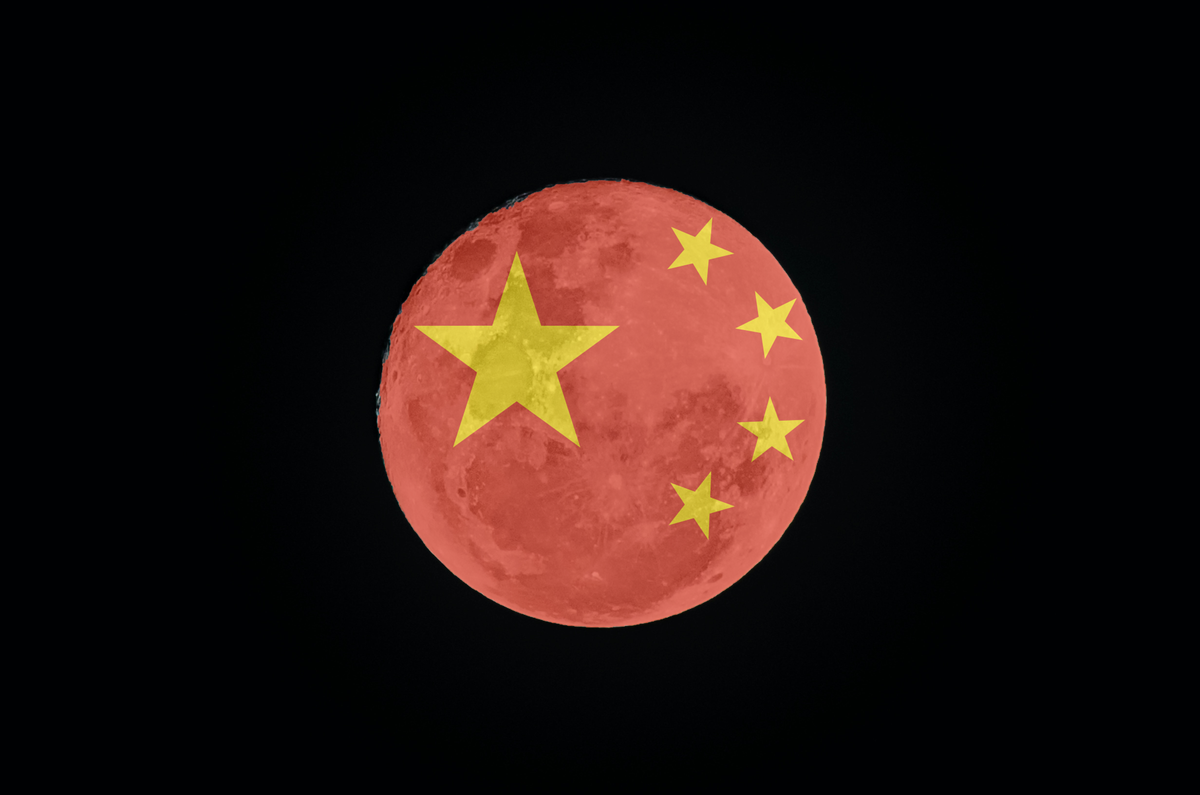NASA Chief Warns of Chinese Moon Domination
Is there a better example of jingoism than fearmongering about a lunar occupation by China?

Yes, the headline is accurate.
In a January 1 interview with Politico, NASA Chief Bill Nelson sounded alarms that the moon was in danger of being landed on by someone other than the USA. Specifically, that China would “try to dominate the most resource-rich locations on the lunar surface — or even keep the U.S. out.”
The article is more an exercise in patience than a source of information. The piece cites NASA and military figures warning about China’s astonishing achievements in their space program, stoking fear that they’ll overtake the US in a new “space race.”
So besides China’s scientific and structural advancements in their space programs, what evidence does the USA have that China’s intentions on the moon are nefarious? “[L]ook at what they did with the Spratly Islands,” said Nelson.
That point is brought up then not expanded upon. Whether intentional or not, this framing and its lack of examination implies that China certainly did something there. So what, exactly, did China do with the Spratly Islands?
A 2016 BBC article lists the broad strokes of the Spratly Islands disputes. This is largely one that takes place between China and Vietnam, but other countries around the area lay claim as well, the biggest being the Philippines, though Malaysia and Brunei are also involved. According to the article, China’s claims began in 1947, while Vietnam contests these assertions, with documents proving the use of the islands for various resources from the 17th century. Taiwan also claims every territory that China does. Though there has been friction and deaths on occasion in the decades since, mostly between Vietnam and China, violence has largely not been a main factor in the disputes.
So what has China done with the Spratly Islands? The issue itself deserves far more of a deep-dive than this article can provide, but the short answer is not congruent with the conclusion. They have introduced military capacity in an area where they claim usage rights. These usage rights haven’t been invoked in the lunar context.
The second space expert spouting yellow peril rhetoric in the article is Terry Virts, a former commander of the International Space Station and Space Shuttle. Virts, it should be noted, is also a United States Air Force colonel. He warns about the sinister intentions of Beijing in the article, and the capacity for their moon missions to do things like disrupt communication. “There is potentially mischief China can do on the moon… There is real concern about Chinese meddling.”
Concern from who? Certainly not China, who rejects this framing entirely. Liu Pengyu, speaking for the Chinese Embassy in Washington said that outer space was no place for conflict.
The exploration and peaceful uses of outer space is humanity’s common endeavor and should benefit all. China always advocates the peaceful use of outer space, opposes the weaponization of and arms race in outer space, and works actively toward building a community with a shared future for mankind in the space domain.
In fact, both the USA and China have signed the Outer Space Treaty, which governs the legal frame work of outer space law, which states “the Moon and other celestial bodies shall be used exclusively for peaceful purposes.” If the USA and China have both signed this treaty, where is the concern stemming from? Remember, the sole justification given for this panic is China’s activities in the Spratly Islands.
If this is the baseline for concern about activities on the moon, the US has far more to answer for in terms of violating international sovereignty since 1947. Without mentioning the countless wars and military operations by the US, we can look at the South China Sea itself. The Pentagon warns of China’s “aggressive military action” in the area, while the US has five military bases operating out of the Philippines. I’m not a geographer, but I’m fairly certain the South China Sea is closer to China than the US.
While the article itself is laden with issues (there’s that “Chinese communist government” again), what’s far more concerning is the fact these comments, with no evidence at all, are worth reporting in the first place.
The piece takes pains to elaborate how impressive China’s space program is to bolster the threat they pose. The author notes China’s first space station, their plans to land taikonauts on the moon by 2030 and the Chinese probes and rovers that have made it to the far side of the moon for the first time ever. This all comes off as very impressive, especially compared to the lackluster funding NASA received, and their less-than-impressive performance in recent years. Considering these facts, it becomes clear why Nelson may want to raise the alarm about other, far more impressive, space programs.
Meanwhile, Space Force Lt. Gen. Nina Armagno’s comments on China surpassing the US are added in for flavour. Remember when Space Force was rightly seen as a joke? The logo is a blatant Star Trek reference, their theme song was a laughing stock upon release and people around the country have mocked them endlessly since. In truth, Space Force was always meant to re-enforce US hegemony in the military sphere. Their purpose is to assert that their presence will be felt outside the outer reaches of our atmosphere, and that’s what they’re doing now. When a military commander says a rival country’s comparable fields have made stunningly fast progress, the unsaid intent is to harden jingoistic sensibilities.
And harden them they did. For example, prominent news YouTuber Philip DeFranco released a short video seemingly informed by this same article with the information incredibly distorted. Here’s the transcript for the 13-second clip.
NASA says that China could attempt to annex large parts of the moon if they win the new space race. This is the same thing China’s trying to do in the South China Sea. While the United States is the only country who have actually landed on the moon and notably didn’t try to annex it, by finder’s keepers rules, the moon belongs to the United States.
It’s truly impressive how 13 seconds and three sentences could contain such nonsense. The use of “annex” here is particularly confusing. At no point did any article I found on the subject use that word, which particularly has violent military implications. The reference to the South China Sea is asinine and devoid of context, and you don’t need me to explain why “by finders keepers rules” is laughable. Though, in fairness to the US, the moon is one of the few places on Earth they haven’t tried to annex. While I usually wouldn’t discuss such tripe, the video has gotten reach. The clip has 694k views on TikTok and 168k on YouTube.
This all culminates into an interesting question: If not China, who benefits from the extraction of lunar resources? It won’t be the vast majority of the US. Like all resource extraction endeavours, those who benefit the most are the stockholders and executives of corporations who bleed areas dry for massive profit. This isn’t to say China, in comparison, would immediately hand over lunar resources to every resident of Earth, but this is meant as a distraction tactic for those gullible enough to believe the US has the right to the moon. They don’t.
Save for the moon landing, the US lost to the USSR at every turn in the space race. The only reason the rhetoric is heating up against China is because it’s a surefire way to whip the public into a patriotic frenzy, with the goal being to pressure the Biden administration into more funding. It works because Americans cannot fathom losing the rallying cry of US nationalism even liberals find pride in: the moon landing. If the US truly favoured a neutral moon between themselves and China, they would commit to treaties. Since they have no interest, China is pursuing their own missions. Who can blame them?
Correction: While this piece made mention of the Moon Treaty, it has been updated to include the Treaty on Principles Governing the Activities of States in the Exploration and Use of Outer Space, including the Moon and Other Celestial Bodies, more commonly referred to as the Outer Space Treaty. This was omitted from the original version of this story. Here is the original paragraph for posterity’s sake:
“Whether or not you believe that China is sincere in its aim for outer space, what is far more indicative of the issue of lunar resource extraction is the behaviour and rhetoric of the US. There’s a UN treaty agreeing that the moon should not be claimed for resources from 1979. No space-faring nation has signed it. That includes China, but also the US. So in other words, neither has committed to a method that regulates how moon missions are approached. Further to this, remember that the sole justification given for this panic is China’s activities in the Spratly Islands.”
We regret its omission.





